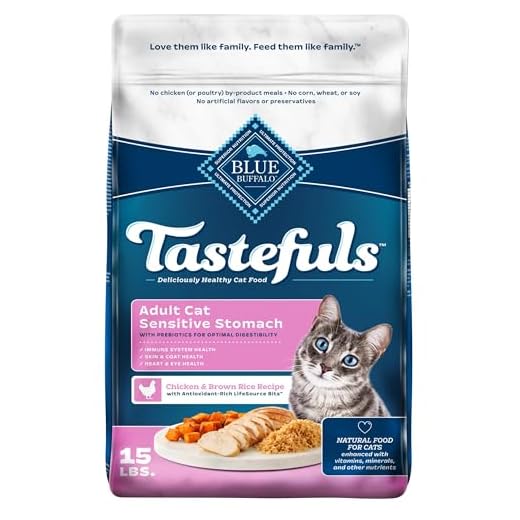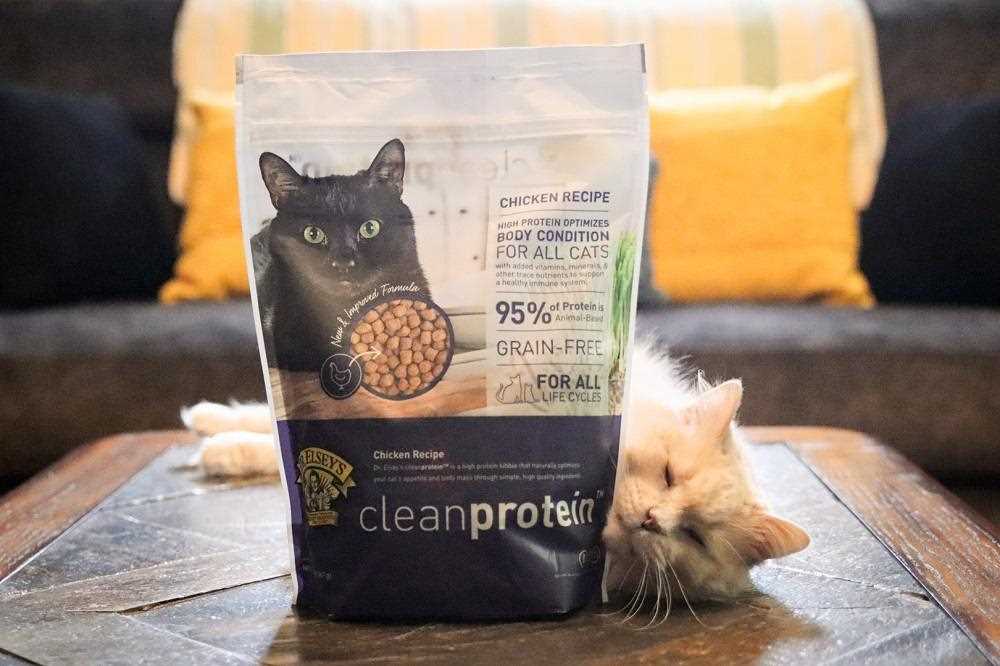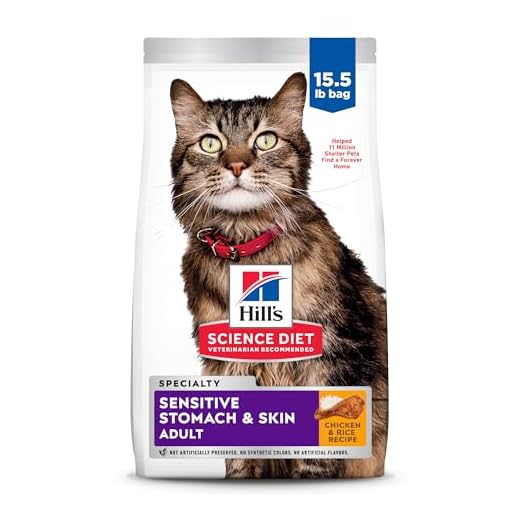




If your feline friend often experiences vomiting, selecting the right nutrition is paramount. This article outlines several highly recommended options specifically designed to support digestive health and minimize gastrointestinal distress. Each selection is backed by nutritional science and positive reviews from pet owners.
This guide is beneficial for pet parents who are concerned about their companion’s digestive issues. By understanding the ingredients and formulations that can help reduce vomiting, you can make informed decisions that enhance your pet’s well-being. The products highlighted here focus on quality, digestibility, and overall health benefits.
In the following sections, you’ll find a breakdown of various brands and their unique formulations, each tailored to support sensitive stomachs. The article includes details on key ingredients, feeding guidelines, and tips on transitioning your pet to new options. With this information, you can ensure your beloved pet receives the care they need while enjoying their meals.
Best Dry Cat Food for Cats That Experience Vomiting
Choosing the right nourishment for felines prone to regurgitation involves careful consideration of ingredients and formulation. High-quality options should focus on easily digestible components, which help minimize gastrointestinal distress.
Look for products that feature a limited ingredient list, as they reduce the likelihood of triggering sensitivities. Ingredients such as real meat, fish, or poultry should be prioritized, while fillers like corn and soy should be avoided, as they may exacerbate digestive issues.
Key Features to Consider
- Protein Source: Select options with high-quality animal proteins to support overall health.
- Fiber Content: Moderate fiber levels can aid digestion and help prevent hairball formation.
- Probiotics and Prebiotics: These beneficial ingredients promote gut health and improve digestion.
- Grain-Free Options: Some pets may benefit from grain-free diets, which can be gentler on the stomach.
Monitor your pet’s response to any new diet. Transition gradually to avoid further upset. Consulting with a veterinarian can provide personalized guidance tailored to your feline’s specific needs.
Understanding the Causes of Vomiting in Cats
Vomiting in felines can arise from various factors. Recognizing the underlying reasons is essential for effective management and prevention. A common cause is dietary indiscretion, where an animal consumes something unsuitable, leading to digestive upset.
Another frequent issue is the consumption of hairballs, particularly in long-haired breeds. The buildup of fur in the gastrointestinal tract can trigger regurgitation. Additionally, medical conditions such as infections, parasites, or metabolic disorders may contribute to this symptom.
Factors Contributing to Vomiting
A variety of elements can influence the occurrence of vomiting:
- Dietary Choices: Sudden changes in diet or low-quality ingredients can irritate the stomach.
- Eating Habits: Rapid eating or overeating may cause the animal to vomit shortly after meals.
- Environmental Stress: Changes in surroundings, such as moving or new pets, can lead to anxiety-induced vomiting.
- Health Issues: Conditions like pancreatitis, kidney disease, or hyperthyroidism may manifest through vomiting.
Monitoring and addressing these factors can significantly improve a pet’s health:
- Evaluate dietary components and gradually introduce new options.
- Consider portion control to prevent overeating.
- Provide a stress-free environment, allowing the animal to adjust comfortably.
- Consult a veterinarian if vomiting persists, as it may indicate a serious condition.
Understanding these causes empowers pet owners to take proactive steps towards their companions’ well-being.
Ingredients to Look for in Cat Food
When selecting a suitable meal for your feline, it is essential to focus on high-quality components that promote digestive health. Certain ingredients can help minimize the likelihood of vomiting and ensure your pet receives balanced nutrition.
Prioritize protein sources as the primary ingredient. Look for real meat, such as chicken, turkey, or fish, which provides the necessary amino acids for muscle maintenance and overall health. Avoid meals with vague terms like “meat by-products,” as they often contain lower-quality protein.
Key Ingredients to Consider
- Digestible Carbohydrates: Choose options like brown rice, sweet potatoes, or peas that offer energy without causing digestive upset.
- Probiotics: Ingredients such as chicory root or fermented components can support gut health and improve digestion.
- Omega Fatty Acids: Look for sources like fish oil or flaxseed, which promote a healthy coat and skin while also supporting overall health.
- Fiber: Ingredients like beet pulp or pumpkin can help regulate digestion and prevent hairballs, which can lead to vomiting.
Additionally, avoid artificial additives, fillers, and excessive grains that can lead to gastrointestinal issues. Always check for a balanced formulation that meets the nutritional levels established by relevant authorities.
Review of the Most Recommended Brands for Sensitive Stomachs
For felines experiencing digestive issues, selecting a suitable diet can significantly improve their well-being. Several brands are recognized for their formulations designed specifically for sensitive stomachs, focusing on easily digestible ingredients and optimal nutrient profiles.
When assessing these brands, it’s important to consider the sources of protein, the presence of probiotics, and the balance of fibers. High-quality proteins from real meat are essential, as they promote healthy digestion and provide the necessary energy.
Key Features to Look For
- High Digestibility: Look for options with ingredients that are easy to break down, such as chicken or fish meal.
- Limited Ingredients: Formulas with fewer components can reduce the risk of allergic reactions and digestive upset.
- Probiotics: Beneficial bacteria help maintain gut health and support digestion.
- Soluble Fiber: Ingredients like beet pulp can aid in digestion and promote a healthy stool.
It’s also advisable to check the absence of artificial additives, fillers, and common allergens like corn or soy. These can exacerbate digestive issues and lead to discomfort.
Consulting with a veterinarian is beneficial when choosing a new diet, as they can recommend the most appropriate options based on individual health needs. Monitoring your pet’s response to the diet is essential, as it can take time to see improvements.
How to Transition Your Cat to New Dry Food Safely
Begin the process by gradually mixing the new product with the existing one. Aim for a transition period of about 7 to 10 days to allow your feline companion to adjust without upsetting their stomach.
Start with a small ratio, such as 25% of the new option combined with 75% of the current choice. Monitor your pet’s reaction closely during this initial phase. If any signs of distress occur, slow down the transition.
Steps for a Smooth Transition
- Days 1-3: Mix 25% of the new variety with 75% of the old. Observe for any adverse reactions, including vomiting or changes in appetite.
- Days 4-6: Increase the new option to 50%, reducing the old to 50%. Continue monitoring for tolerance.
- Days 7-10: Adjust the mix to 75% new and 25% old. Watch for any signs of gastrointestinal upset.
- After 10 Days: If all goes well, transition to 100% of the new variety. If issues arise, consider lengthening the process.
Ensure fresh water is always available to aid digestion. If your pet shows persistent signs of discomfort, consult a veterinarian for advice tailored to their needs.
Feeding Tips to Reduce Vomiting Episodes in Cats
Introduce meals gradually to allow the digestive system to adapt. Start with small portions and gradually increase the amount over several days. This approach helps minimize stress on the stomach and reduces the likelihood of regurgitation.
Opt for high-quality nutrition that supports digestive health. Look for options with limited ingredients, easily digestible proteins, and added fiber to promote gut health. Avoid products with excessive fillers, artificial additives, or allergens that may irritate the stomach.
Additional Strategies to Consider
- Feed smaller, more frequent meals throughout the day to prevent overeating.
- Ensure fresh water is always available to keep your feline hydrated.
- Monitor your pet’s eating habits and behaviors to identify any potential triggers for vomiting.
- Consult a veterinarian if vomiting persists to rule out underlying health issues.
Maintaining a consistent feeding schedule can also help your pet feel more secure and reduce anxiety, which is sometimes linked to vomiting. Ensure the feeding area is calm and quiet to encourage relaxed eating.
Implementing these strategies can significantly reduce instances of vomiting, leading to a healthier and happier life for your pet.
Best dry cat food for cats that throw up
Features
| Part Number | 18166315 |
| Model | 444207 |
| Warranty | With nearly 50 years of scientific research and observation, Royal Canin continues to deliver targeted nutrition to feed every pet’s magnificence. Not satisfied? Then neither are we. Our formulas are 100% satisfaction guaranteed. (Just contact us for more details.) |
| Size | 6 Pounds (Pack of 1) |
Features
| Part Number | 70 |
| Model | 70 |
| Warranty | If you have a question that needs immediate attention, please call (800) 919-2833. |
| Color | Brown |
| Size | 12 Pound (Pack of 1) |
Features
| Part Number | RC471550 |
| Model | RC471550 |
| Warranty | With nearly 50 years of scientific research and observation, Royal Canin continues to deliver targeted nutrition to feed every pet’s magnificence. Not satisfied? Then neither are we. Our formulas are 100% satisfaction guaranteed. (Just contact us for more details.) |
| Size | 3 Ounce (Pack of 24) |
Features
| Part Number | 017800179188 |
| Model | 00017800179188 |
| Warranty | Purina guarantees outstanding quality and taste. If for any reason you’re not satisfied, simply let Purina know why. Please contact Purina directly at (800) 778-7462 within 60 days of date on receipt for assistance. Or, feel free to mail your original purchase receipt with the price circled, a brief explanation of why you were dissatisfied with our products, the “Best If Used By” date box from the package, along with your name and street address (P.O. Box not accepted) to: Purina, Consumer Services, PO Box 340, Neenah WI 54957 |
| Color | Other |
| Release Date | 2023-01-23T00:00:01Z |
| Size | 22 Pound (Pack of 1) |
Features
| Part Number | 596641 |
| Model | 800362 |
| Warranty | If you have a question that needs immediate attention, please call (800) 919-2833. |
| Color | Brown |
| Size | 15 Pound (Pack of 1) |
Features
| Part Number | 017800144100 |
| Model | 00017800144100 |
| Color | Other |
| Release Date | 2023-01-23T00:00:01Z |
| Size | 22 Pound (Pack of 1) |
| Publication Date | 2011-09-01T00:00:01Z |
Features
| Part Number | 8878 |
| Model | 8878 |
| Color | White |
| Size | 15.5 Pound (Pack of 1) |
Video:
FAQ:
What are the common reasons cats throw up after eating?
Cats may vomit for several reasons, including eating too quickly, food allergies, or sensitivities to certain ingredients. Sometimes, they may also vomit due to hairballs, gastrointestinal issues, or underlying health problems. It’s important to observe your cat’s behavior and consult a veterinarian if vomiting persists.
How can I choose the best dry cat food for a cat that frequently vomits?
When selecting dry cat food for a cat that vomits often, consider options that are specifically formulated for sensitive stomachs. Look for foods with high-quality proteins, fewer fillers, and limited ingredients. Additionally, consult your veterinarian for recommendations tailored to your cat’s specific needs and health condition.
Are there specific ingredients to avoid in dry cat food for cats that throw up?
Yes, certain ingredients can trigger vomiting in sensitive cats. Avoid foods with artificial additives, high levels of grains, and common allergens like dairy or beef. It’s also wise to steer clear of low-quality fillers that can upset your cat’s stomach. Reading the ingredient list carefully can help you make a suitable choice.
Can changing my cat’s diet help reduce vomiting?
Changing your cat’s diet can potentially help reduce vomiting, especially if the current food contains ingredients that irritate their stomach. Gradually introducing a new, high-quality dry cat food formulated for sensitive stomachs may lead to improvements. Always consult with your veterinarian before making significant dietary changes to ensure the new food meets your cat’s nutritional needs.
What are some recommended dry cat food brands for cats that vomit frequently?
Several brands are known for their dry cat food options suitable for cats that experience vomiting. Look for products from brands like Royal Canin, Hill’s Science Diet, and Purina Pro Plan, which have specific formulas for sensitive stomachs. Always check with your veterinarian for personalized recommendations based on your cat’s health and dietary needs.











